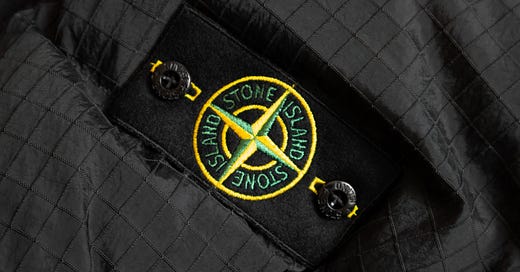Get the badge in: Stone Island, football's Casuals, and geopolitical branding
The importance of sport and fashion brands in countercultural movements
The recent 2025 film by Nick Love, Marching Powder, offers more than just a comedic glimpse into aging football hooliganism, it captures the enduring legacy of a genuine countercultural movement whose aesthetic has paradoxically become a global economic force.
At the centre of this phenomenon sits fashion brands such as Fila, Sergio Tacchini, Aquascutum, and Stone Island.
But it's Stone Island that captures our imagination here.
The Italian sportswear brand whose compass badge signifies something far beyond mere fashion preference.
That little patch labelled onto sleeves has transformed from a knowing nod between football casuals to a globally recognised symbol worn by everyone from The Den to Premier League managers.
Casuals as Authentic Counterculture
Unlike manufactured rebellions of corporate marketing, the Casual movement emerged organically in 1980s Britain as working-class football supporters rejected both mainstream fashion and the skinhead aesthetic that had dominated terraces.
Away days to European fixtures exposed British supporters to continental brands previously unknown at home.
This appropriation represented a true counter-narrative, young men from economically depressed communities saving for premium continental sportswear, creating distinctive class identities through consumption patterns that defied their economic positioning.
What makes the Casual movement a genuine counterculture isn't merely aesthetic choice, but its complete rejection of authorised narratives about working-class life.
It involved international travel, cosmopolitan taste, and sophisticated brand awareness decades before social media.
Films like ‘Marching Powder’ capture this subculture's longevity, showing its evolution beyond mere fashion into a complex identity system with its own economic logic.
From Terraces to Global Strategy
Stone Island's journey from terrace favourite to global premium sportswear exemplifies how subcultural authenticity becomes commodified.
The brand's appeal lies in its dual positioning, signifying insider knowledge to those within football culture while offering technical innovation and Italian craftsmanship to broader markets.
This duality allows Stone Island to maintain credibility while expanding globally.
When Pep Guardiola, perhaps football's most cerebral figure, adopts Stone Island touchline attire, it creates a perfect symbolic bridge.
The working-class terrace aesthetic now adorns one of football's intellectual elites, rendering the brand simultaneously authentic and aspirational.
This transformation didn't happen accidentally but reflects Stone Island's strategic understanding of football's cultural economy.
Nation Branding Through Subcultural Capital
Here lies the most fascinating dimension: how nations leverage subcultural capital for geopolitical positioning.
Italy's global reputation for craftsmanship and design excellence is reinforced through brands like Stone Island that transcend their origins.
When British working-class culture embraces Italian technical sportswear, it creates a powerful endorsement of Italian manufacturing excellence that strengthens national brand perception.
Similarly, Manchester City's Guardiola, representing Abu Dhabi’s most significant soft power investment, wearing an Italian brand beloved by British working classes creates a complex geopolitical fashion statement.
This intersection of Gulf capital, Italian manufacturing, and British subcultural approval generates formidable brand energy that transcends conventional marketing.
The casual movement's aesthetic preferences have become vehicles for nation branding and geopolitical positioning, terrace fashion decisions now influence global perception of national manufacturing capabilities.
As ‘Marching Powder’ demonstrates, what began on football terraces now shapes how nations position themselves in the global cultural economy, revealing how authentic counterculture becomes instrumental in establishing economic and cultural legitimacy on the world stage.




